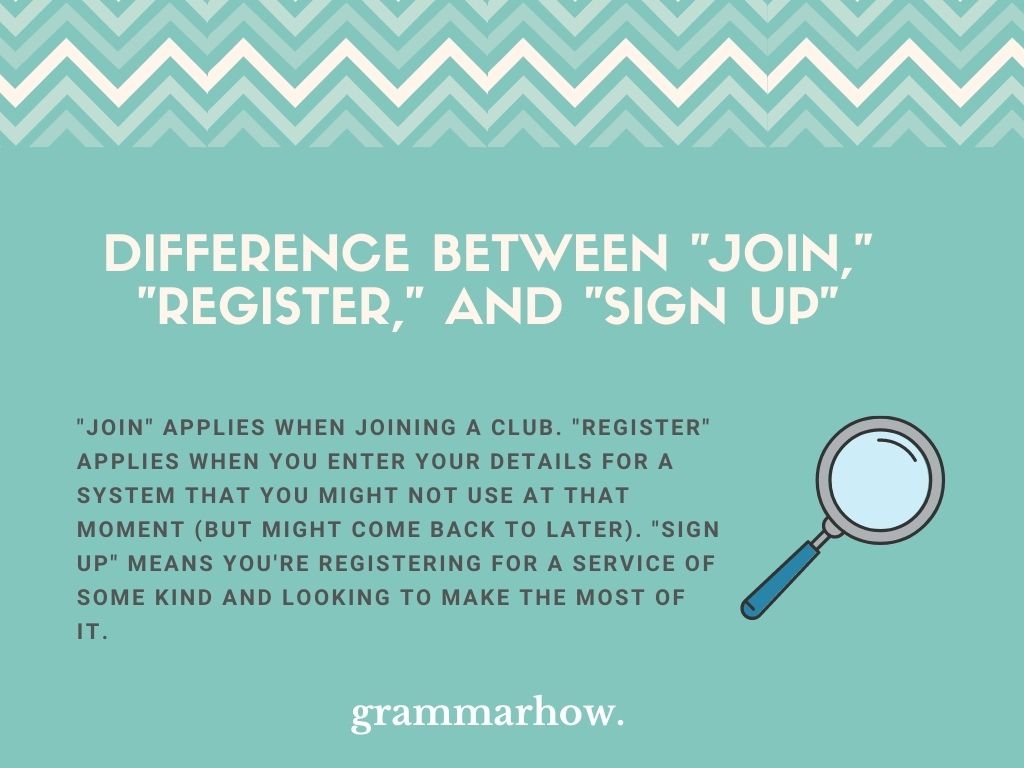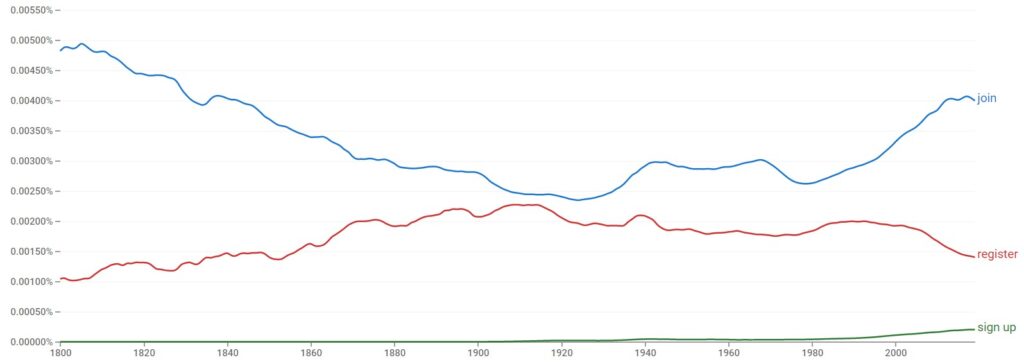There are a few different words you can use when signing up for different services. “Join,” “register,” and “sign up” are all potential options. This article will explain the differences between them, and we’ll share which one gets used the most.
What Is The Difference Between “Join,” “Register,” And “Sign Up”?
“Join” applies when joining a club. “Register” applies when you enter your details for a system that you might not use at that moment (but might come back to later). “Sign up” means you’re registering for a service of some kind and looking to make the most of it.

“Join” works best in real life since it’s much more common for you to join clubs set up locally.
“Register” applies to both real life and online presences. We can register to vote, but we can also register our names for websites that we might be buying from.
“Sign up” typically only applies to online situations. It’s common for people to sign up for websites when they expect to use a service. Once their details are entered, they are usually allowed to use the system.
What Does It Mean To “Join”?
“Join” means that we are welcoming ourselves into a club. We often include our details and register our interest with them before doing this. Different clubs have different requirements for joining, but they usually all require your name and personal details.
Once you’re part of a club, no further information is required. It might help to see some examples of how to use it:
- I’d like to join the rowing club. I think it would be really good for me, but I don’t know how to go about it.
- If you’re looking to join our committee, you’ll have to prove yourself. We don’t just accept anybody!
- You’re not going to join this company without first showing that you’re capable of working with us.
- I think he should join the chess club. I’ve never met somebody with the skills he possesses for the game.
- Why don’t you want to join? I think you’d feel right at home here, and it’s such a shame to see you go!
What Does It Mean To “Register”?
“Register” means that we’re entering our details to do something. There is usually no need for us to do something right away, as it’s more common to “register your interest” for something that might happen in the future.
It’s more common for you to “register” and save your details for a later time. They are stored in a database until they are needed.
- I’m not going to register to vote. I don’t know anything about politics, so it would be a waste.
- Are you going to register your interest in this survey? You never know when that might be useful to do.
- He’s going to register later. He won’t need to do much else with it, after all.
- If you’re not planning to register for this service, we don’t have much else to talk about. Sorry that I wasted your time.
- I would like to register to vote for this. I think it’s a really important cause, and I want to make sure my voice is heard.
What Does It Mean To “Sign Up”?
“Sign up” typically means that you are registering for a service, but you expect to use it immediately. It works best for social media websites or job listings that you know you’re going to start working with immediately.
Unlike registering, “signing up” doesn’t come with a wait. Once your details are entered, you’re free to start using the service however you please.
- Are you going to sign up for Facebook? I always thought it was strange that you didn’t have an account.
- You should sign up! You’re only missing out on all the important things going on in the world by not being online.
- I don’t sign up for any social media. I really don’t see the point in doing it, as there’s nothing I want to share.
- Why are you signing up to sign the army? I didn’t think that was something you’d be interested in doing.
- If you haven’t signed up yet, what are you doing? You’re wasting a really good opportunity here.
Is “Join,” “Register,” Or “Sign Up” Used The Most?
According to Google Ngram Viewer, “join” is the most common choice of the three. That’s because it’s a common verb that we can use in many other contexts, so it makes sense that it’s the most popular.

Interestingly, “register” is the next most popular, and many people will use it for both real life and online services. However, “sign up,” which seems like it would be more popular, is not used anywhere near as much in any comparisons.
“Sign up” has certainly gotten more popular in the last few years, but it’s nowhere near as popular as the others. Perhaps in a few more years (once the internet has had more time to overtake traditional language choices), “sign up” will be more popular.
Do You “Join,” “Register,” Or “Sign Up” To Social Media?
Finally, it might help to get a better idea of which social media sites use which phrase.
This table will show you which phrase is most popular for each of these major sites:
| Gmail | Sign up |
| Sign up | |
| Join | |
| Sign up | |
| Sign up |
It’s clear that “sign up” is the most popular choice for social media sites. Google, Facebook, Twitter, and Instagram all make use of it. If you want to create an account, “sign up” is the phrase they use. LinkedIn is the only one that uses “join.”
“Join” seems to work better for LinkedIn because it’s a job-based website. It is much closer to being a club than any of the other sites. Its selling point is that it introduces you to like-minded people who work in similar fields as you (like a club would do).
“Register” isn’t used by any of the websites. That’s because “register” usually works best when saving your details for later. However, on social media sites like these, you want to be able to input your data and start using them right away.
You may also like: Sign Up vs. Sign In vs. Log In: Difference Explained (+Quiz)
